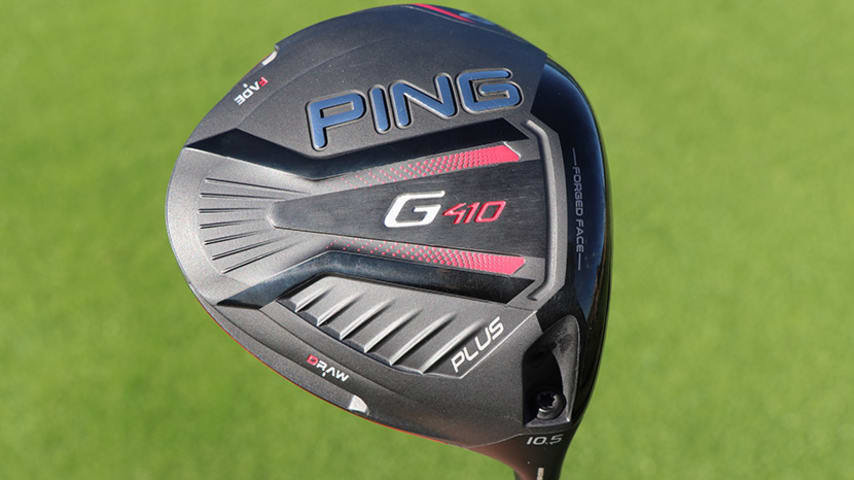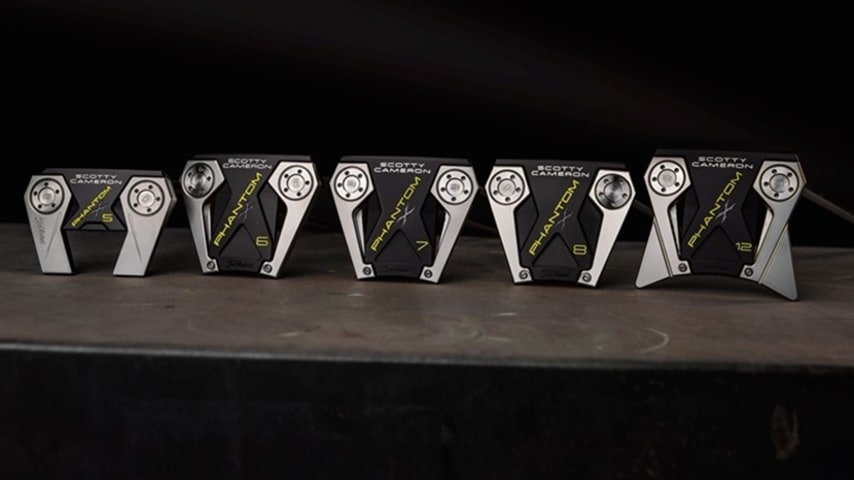Ping launches its new G410 drivers, featuring a weight-adjustable version
5 Min Read

Building upon its popular G400 line of drivers, the Ping G410 Plus and G410 SFT drivers offer not only greater custom fitting options, according to the company, but also more overall ball speed and forgiveness. To accomplish this, you’ll notice a number of changes to the driver designs compared to their predecessors.
The most noticeable change is the inclusion of a moveable tungsten weight in the rear of the G410 Plus driver head. There are three weight locations – draw, neutral and fade – that Ping says allows for a difference of 20 yards between draw and fade. For further customization, the G410 Plus, and the more forgiving SFT (Straight Flight Technology) head, both have an eight-setting, aluminum/thermoplastic hosel that allows for more loft and lie options than previous Ping drivers.
While the SFT head does not have a moveable weight, it does have a fixed tungsten weight in the very rear of the sole on the heel side to shift CG (center of gravity) rearwards and also provide a draw bias.
At address, you’ll also notice a new “creased crown” design to stiffen the structure. This combines with Ping’s familiar, weight-saving “Dragonfly” technology that’s designed to thin out the crown to save weight from the top of the club and be moved lower in the head. You may also notice that the Turbulators on the front of the crown, designed to increase aerodynamic qualities, have been given a more aggressive look. The result of these technologies, according to Ping, is a faster look that also helps with alignment.
While the bodies of the multi-material, 455cc constructions are made of cast Ti-8-1-1, the faces are made from forged T9S+ that are designed thinner in certain areas to increase flexibility and raise ball speed.
The Ping G410 Plus (swing weight D3, loft options 9, 10.5 and 12 degrees) and the G410 SFT (swing weight D1, loft option 10.5 degrees) will come stock with an Alta CB (counter-balanced) Red 55, a Ping Tour, a Mitsubishi Tensei CK Orange, or a Project X EvenFlow Black shaft. They will each sell for $540 starting on Jan. 21.
Ping’s G410 fairways, hybrids and crossover
To go along with its 17-4 stainless steel bodies, the faces of the Ping G410 fairways, hybrids and Crossover are made from C300 maraging steel to allow for thinner constructions that yield faster ball speeds and higher launch, according to the company.
“With maraging steel, we have a material that allows us to go extremely thin with the face to give us the faster ball-speed gains we’re seeking for more distance and higher launch,” said Ping president John K. Solheim. “The results have been amazing as we’re seeing face flexing equal to the thickness of the face.”
While the G410 fairways – there’s a standard model, an SFT and an LST – have a fixed Tungsten weight in the low-back portion of the head for greater forgiveness, Ping says weight has been pushed more forward in the heads compared to the G400 models in order to “deliver more energy from the shallower face while providing greater stability.” Like the drivers, the fairway woods also have an eight-option adjustable hosel.
The SFT fairway wood has heel-side weighting for a draw bias, and a head that is slightly larger for greater forgiveness, according to Ping. The new LST fairway wood option, which is new for 2019, has a lower and more forward CG (center of gravity) than the standard model for an overall lower spin and higher launch.
The fairway woods (14.5, 17.5, 20.5, 23.5, 14.5 LST, 16 SFT, 19 SFT and 22 SFT will sell for $310 apiece.
The Ping G410 hybrids (17, 19, 22, 26 and 30 degrees), which are adjustable for the first-time with the same eight-option adjustable hosels as the drivers and fairways, have larger profiles and back weight to increase forgiveness, says Ping. They will sell for $270 each.
The Ping G410 Crossover clubs, now available in 17, 20 and 23-degree options, have 30-gram Tungsten weights in the toe portion of the soles to increase forgiveness. Also, compared to the G400 Crossover clubs, the G410 versions are shorter heel-to-toe and have narrower soles. They will sell for $247.50 each.
Ping G410 irons
Compared to the previous Ping G400 irons, Ping says the new G410 irons have smaller shapes, less offset and higher MOI (moment of inertia).
Ping saved weight from the face and the back cavity with its next-generation COR-Eye technology, and placed the saved weight into the perimeter of the club heads, thus boosting MOI by 8 percent, according to the company. Ping also says the faces are more flexible, producing higher max heights and greater distances.
“Our innovations like COR-Eye technology have allowed us to re-imagine the way we engineer an iron,” said Solheim. “By increasing ball speed as much as we have in recent models, our irons launch much easier and higher than ever. As a result, we can experiment with the size and shape of the head while improving the MOI properties so critical to consistent performance.”
The G410 irons, compared to the G400 irons, have shorter blade lengths and 10 percent less offset. They have Hydropearl 2.0 finishes, aluminum/elastomer back badges to enhance sound and feel, and they have the same grooves used in Ping’s Glide 2.0 wedges.
Ping’s G410 irons (4-PW, UW, SW, LW) are selling for $135 per iron in steel and $150 per iron in graphite.












